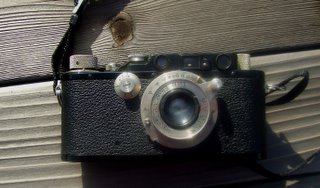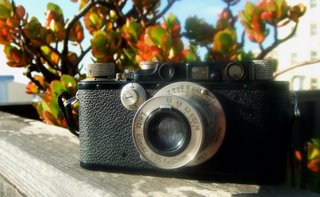Traveling back to 1933...
I had been looking at - and thinking about buying - an older screwmount Leica for quite some time when 'the right deal' came my way a few weeks ago.
Buying a screwmount Leica is buying into a slow, quirky and outdated system.
There is no autofocus, no internal metering, no film advance lever, slow film loading system, pretty horrible range- and viewfinder windows (yes..one each..) and if you stick with the earlier equipment the lenses are uncoated and often pretty soft and low in contrast.
Take all that into consideration and then add the fact that you are still looking at spending several hundred dollars to get a body, a lens or two and some accessories and you realize that you are either insane or...no that's the only possibility.
You're insane.
So...after I had performed the initial self-health-assessment above I went ahead and bought my LTM dream kit.
The deal consisted of;
a black Leica III (F) from 1933,
a 50/3.5 Elmar from 1933
a 90/4 Elmar fromm 1934
a VIDOM finder,
a FISON hood for the 50/3.5 Elmar, and
various filters and stuff.
All is in pretty much near-new condition which considering the fact that this kis is over 70 years old is pretty amazing in itself.
Using the camera
After playing with it, taking photos of it and fondling it in general I decided it may be a good idea to actually use the same as well so I decided to load it with a roll of Fuji Neopan 400.
Film Loading
Back in 'the days' the film leader was much more narrow than on modern films so one has to trim about 10 cm of the film in order to be able to load it into the camera. There are some easy-to-follow instructions here.
Focusing and framing
This depends on what model of the camera you have and the following is based on the Leica III (F).
The camera has a coupled rangefinder and there are two windows - one for focusing (1.5x magnification) and one for framing (without framelines or parallax compensation and built to support the equivalence of a 50mm view).
The limited viewfinder window requires one to use external finders for anything but 50mm.
There are however a number of turret, zoom or fixed external finders available so look around and pick one that suits your need and preference. My kit came with the VIDOM finder which is a zoom type of finder - a 'zoom' in the way that it narrows down the view according to the focal length you dial in but the perspective is fixed as it doesn't change the magnifcation as you zoom.
Wth two windows the picture taking process is indeed slowed down. Focus in one window, move your eye to the other window - or the external finder - frame the photo and press the shutter. Not for fast moving sports photography that's for sure.
Film Advance
Once you have loaded the film you dial the film counter manually to '1' and as you advance the film it automatically moves it to the next number.
Advancing the film is done by turning a knob as there is no advance lever.
I still have my first fim in the camera but I'm hoping to have it developed later this week and will then post here to show what the old Elmars (50 and 90) were able to produce.
Finally - next on the shopping list is a half-case from Luigi for it. He will start working on it on December 28th so I am hoping to have it early-mid January of next year. Call it a late xmas gift :)
Below are some photos of the camera..photos BY the camera is coming later.. :)


Buying a screwmount Leica is buying into a slow, quirky and outdated system.
There is no autofocus, no internal metering, no film advance lever, slow film loading system, pretty horrible range- and viewfinder windows (yes..one each..) and if you stick with the earlier equipment the lenses are uncoated and often pretty soft and low in contrast.
Take all that into consideration and then add the fact that you are still looking at spending several hundred dollars to get a body, a lens or two and some accessories and you realize that you are either insane or...no that's the only possibility.
You're insane.
So...after I had performed the initial self-health-assessment above I went ahead and bought my LTM dream kit.
The deal consisted of;
a black Leica III (F) from 1933,
a 50/3.5 Elmar from 1933
a 90/4 Elmar fromm 1934
a VIDOM finder,
a FISON hood for the 50/3.5 Elmar, and
various filters and stuff.
All is in pretty much near-new condition which considering the fact that this kis is over 70 years old is pretty amazing in itself.
Using the camera
After playing with it, taking photos of it and fondling it in general I decided it may be a good idea to actually use the same as well so I decided to load it with a roll of Fuji Neopan 400.
Film Loading
Back in 'the days' the film leader was much more narrow than on modern films so one has to trim about 10 cm of the film in order to be able to load it into the camera. There are some easy-to-follow instructions here.
Focusing and framing
This depends on what model of the camera you have and the following is based on the Leica III (F).
The camera has a coupled rangefinder and there are two windows - one for focusing (1.5x magnification) and one for framing (without framelines or parallax compensation and built to support the equivalence of a 50mm view).
The limited viewfinder window requires one to use external finders for anything but 50mm.
There are however a number of turret, zoom or fixed external finders available so look around and pick one that suits your need and preference. My kit came with the VIDOM finder which is a zoom type of finder - a 'zoom' in the way that it narrows down the view according to the focal length you dial in but the perspective is fixed as it doesn't change the magnifcation as you zoom.
Wth two windows the picture taking process is indeed slowed down. Focus in one window, move your eye to the other window - or the external finder - frame the photo and press the shutter. Not for fast moving sports photography that's for sure.
Film Advance
Once you have loaded the film you dial the film counter manually to '1' and as you advance the film it automatically moves it to the next number.
Advancing the film is done by turning a knob as there is no advance lever.
I still have my first fim in the camera but I'm hoping to have it developed later this week and will then post here to show what the old Elmars (50 and 90) were able to produce.
Finally - next on the shopping list is a half-case from Luigi for it. He will start working on it on December 28th so I am hoping to have it early-mid January of next year. Call it a late xmas gift :)
Below are some photos of the camera..photos BY the camera is coming later.. :)


